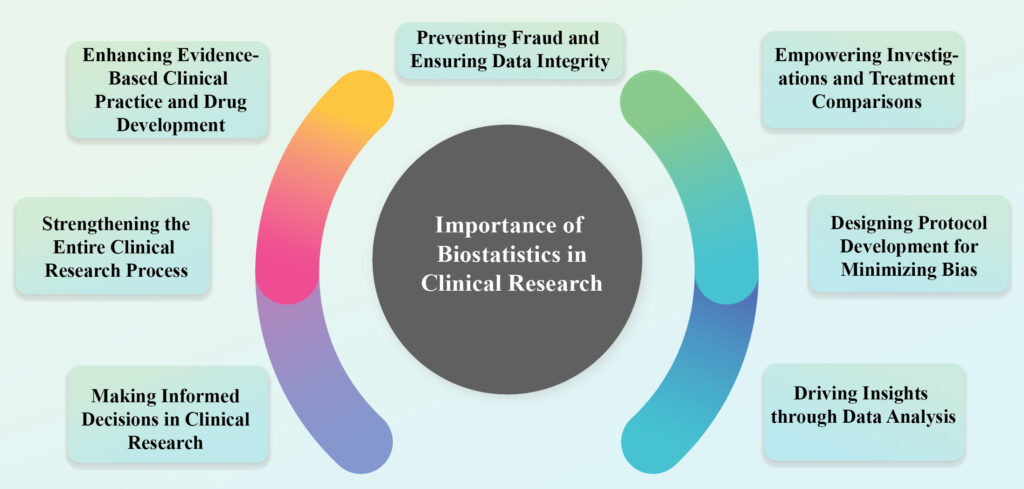Biostatistical Solution Drives Evidence-Based Practice and Drug Development
Biostatistical Solution encompasses the analysis of data derived from biomedical research and continues to be a vibrant field. It has played a pivotal role in clinical research for centuries. From assisting renowned scientists like Charles Darwin and Karl Pearson to aiding contemporary researchers, biostatistics remains instrumental in conducting robust clinical studies and presenting findings in esteemed scientific journals. This blog will explore its applications, benefits, and impact on evidence-based practice and drug development.
Biostatistics Solution by Biostatistics faces intricate challenges with time-to-event data and missing data in various domains such as medicine, genetics, neuroscience, and engineering. Recent breakthroughs in biomedical research have opened up new avenues for statisticians and data scientists. Exciting areas like big data analysis, precision medicine, artificial intelligence, and causal inference have spurred the development of advanced statistical methods and inventive inference techniques. These advancements pave the way for enhanced insights and deeper understanding in the realm of biostatistics.
Importance of Biostatistics in Clinical Research
- Enhancing Evidence-Based Clinical Practice and Drug Development:
The biostatistical analysis serves as a cornerstone for evidence-based clinical practice by evaluating and applying previous research findings to new studies. With the majority of new compounds failing to reach the market, advanced biostatistics plays a crucial role in reducing costs, timelines, and risks associated with drug development. State-of-the-art statistical methods are now integrated into every step of the drug development process, improving the quality of submissions and supporting informed decision-making.
- Strengthening the Entire Clinical Research Process:
Biostatistical Solution by biostatistics actively contributes to the entire clinical research process, from study design and data collection to analysis, interpretation, and reporting. It minimizes biases, identifies confounding factors, measures random errors, and ensures the statistical significance of results. Biostatisticians collaborate with researchers to determine sample sizes, calculate statistical power, assess the efficacy and safety of drugs, and contribute to the development of treatment protocols.
- Making Informed Decisions in Clinical Research:
Biostatistics methodologies find application in diverse areas of clinical research, including epidemiology, clinical trials, population genetics, and systems biology. These methods provide a formal framework to account for variability in patients’ response to treatment, enabling researchers to draw precise inferences and make informed decisions in the face of uncertainty.
- Preventing Fraud and Ensuring Data Integrity:
Biostatistics also plays a crucial role in preventing fraud and maintaining data integrity in clinical research. It helps detect data fabrication and falsification, safeguarding against intentional errors in clinical trials. By quantifying the influence of chance, estimating systematic and random effects, and combining theory with data through formal methods, biostatistics acts as a safeguard against fraudulent practices.
- Empowering Investigations and Treatment Comparisons:
Biostatistical methods have evolved significantly over the centuries, with the introduction of the p-value marking a significant milestone. P-values, widely used in clinical research, allow investigators to investigate proposed medical treatments, compare therapies, and establish optimal treatment combinations. The continuous evolution of biostatistical methods enables prospective experimental design and facilitates more robust research outcomes.
- Designing Protocol Development for Minimizing Bias:
Biostatisticians play a crucial role in protocol development by defining clear objectives and hypotheses, designing studies to minimize bias, justifying sample sizes, and formulating analysis plans. They contribute to the clarity, completeness, and consistency of protocols, ensuring data quality and feasibility. They contribute to study implementation by selecting appropriate sampling methods and implementing randomization procedures. Additionally, they monitor study quality, safety, and efficacy.
- Driving Insights through Data Analysis:
Biostatisticians are involved in data management, overseeing content, design, and validation. Data analysis is another crucial aspect, where biostatisticians develop detailed analysis plans, prepare reports, and contribute to manuscript writing. Harnessing the power of biostatistics, data analysis plays a pivotal role in driving insightful discoveries. By unraveling patterns and trends within complex biomedical data, biostatistics empowers researchers to extract meaningful insights and make informed decisions in clinical research.
Conclusion
The role of biostatistics in clinical research is indispensable. It empowers researchers with robust methodologies, enhances evidence-based practice, supports drug development, prevents fraud, and ensures data integrity. By understanding the multifaceted role and significance of biostatistics, researchers can conduct rigorous studies, produce credible results, and contribute to advancements in clinical research.
WorkSure® offers comprehensive and reliable biostatistical solution services to support your clinical research endeavors. Our team of experienced biostatisticians understands the critical role of statistical analysis in interpreting and deriving meaningful insights from your data. With state-of-the-art statistical methods and advanced software, we ensure the highest level of accuracy and precision in your research findings. Whether you need assistance with study design, data management, analysis, or manuscript preparation, our dedicated team will work closely with you to deliver exceptional results. Trust WorkSure® to provide you with reliable biostatistical solution, empowering your research with robust statistical techniques and driving impactful discoveries in the field of clinical research.
